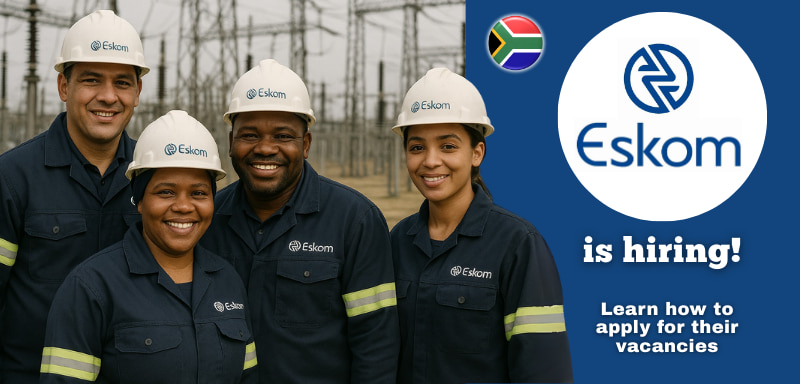Job Opportunities
Eskom careers in 2025: what to know before you apply
From power plants to the grid control room, Eskom offers real impact and stable benefits. Learn the roles in demand, what employees say, and how to tailor your CV with clear results on safety and reliability.
Advertisement

Eskom is South Africa’s state-owned electricity utility. It generates, transmits, and distributes power using coal, nuclear, hydro, and wind.
It remains the backbone of the national grid and a key employer for engineers, technicians, operators, and corporate specialists.
What Eskom is and why it matters
Eskom Holdings SOC Ltd is wholly owned by the South African government. It operates across the full electricity value chain and represents the country in regional power trade. If you want scale, mission, and technical complexity, few employers on the continent match it.
You will be redirected to another website
You’ll receive messages for less than 1 week, with a maximum of 1 message per day. You can unsubscribe anytime by replying STOP. By submitting this form, I confirm that I am 18+ years old and agree to the Privacy Policy and Terms and Conditions. I also provide my signature, giving express consent to receive informational messages via automated emails, SMS, MMS text messages, and other forms of communication. Message frequency may vary as part of our good-faith effort to respond to your inquiry. Message and data rates may apply. Text STOP to cancel. I understand that my consent to receive communications is not a condition of purchase and that I may revoke my consent at any time.
Where the business is going: NTCSA and market reforms
Eskom is unbundling. A new subsidiary, National Transmission Company South Africa (NTCSA), is being stood up to run the grid and enable a competitive power market.
NTCSA’s leadership was formalised in 2024, and the utility reported active operationalisation during 2024–2025.
The unit aims to support a wholesale electricity market, with an initial platform targeted after regulatory clearances. Expect transmission build-out and market process roles to expand.
Private capital will likely play a larger role in grid expansion over the next decade. That implies project, commercial, and regulatory skills will sit alongside classic power-systems expertise.
Candidates who understand procurement models, wheeling agreements, and grid connection processes will be in demand.
What Eskom does and the skills it hires
Eskom runs thermal and nuclear power stations, hydropower schemes, wind assets, and extensive transmission and distribution networks.
Work spans control rooms, substations, maintenance, metering, protection, data and OT security, and customer operations.
Typical profiles include electrical and mechanical engineers, systems and protection engineers, artisans, technicians, operators, project managers, data specialists, SHEQ professionals, and corporate roles in finance, procurement, and HR.
Roles you will often see advertised
Before scanning job boards, map your skills to Eskom’s asset base and processes. Generation plants need maintenance planners and unit controllers focused on reliability and safety.
The grid needs planners, schedulers, and protection specialists to maintain stability. Distribution needs field technicians, metering teams, and customer operations staff to reduce losses and improve service outcomes.
- Engineers: electrical, mechanical, civil, industrial, systems
- Technicians and artisans: electrical, mechanical, instrumentation
- Plant and network operations: unit controllers, network controllers, dispatch
- Project, planning, and asset management: project engineers, planners, asset data
- Digital, IT/OT, cybersecurity, data analytics
- Environmental, safety, and quality (SHEQ)
- Finance, legal, procurement, HR, communications
Early-career pathways and development
Eskom runs bursaries for engineering students and structured graduate and “engineer-in-training” pipelines.
The bursary scheme funds studies in priority disciplines and feeds the graduate cohort. Graduate-in-Training and Engineers-in-Training intakes appear on the careers site and partner graduate portals.
These programs combine rotations, mentoring, and technical accreditation support, building core capability in plant operations, maintenance, network planning, and safety systems.
Many operational clusters also recruit interns and Youth Employment Service–style placements in line with national initiatives.
Short-term contracts and vacation work can serve as feeders into permanent roles. Always verify listings on the official portal before applying and prepare certified copies of academic records and IDs as required.
Pay and benefits: what the data shows
Public data suggests Eskom pays competitively for South Africa. Salary snapshots place engineers roughly in the mid-to-high six figures in rand per year, with senior engineers around the one-million rand mark.
Technicians often land in the mid-hundreds of thousands. Engineers-in-training and graduates start lower but gain structured progression with clear competency milestones.
Treat these figures as directional, not guarantees, since rates vary by plant, province, scarcity, and bargaining outcomes.
For entry and operational roles, market sources show artisans and general workers clustering in lower bands on a cost-to-company basis, with overtime and allowances affecting take-home pay.
Shift work, standby, and site location can move the needle. Check job adverts for grade bands and ask recruiters to clarify how allowance structures, standby pay, and overtime policies apply to the specific unit.
Benefits are a notable part of total reward
Employees typically participate in the Eskom Pension and Provident Fund. Employer contributions are material, and member contributions follow fund rules.
Medical-aid subsidies are common, along with layered leave categories such as annual, occasional, and long-service leave. Some roles include housing, cellphone, or vehicle allowances as per policy.
Bonus pools and performance pay depend on corporate performance and applicable agreements. Review the full package and not just base pay.
Culture, ethics, and recognition
Eskom’s Code of Ethics, “The Way,” frames values captured by ZIISCE: Zero Harm, Integrity, Innovation, Sinobuntu, Customer Satisfaction, and Excellence.
Zero Harm places safety at the center of decisions. Integrity anchors compliance and governance. Sinobuntu highlights respect and teamwork in a diverse workforce.
The company has been certified as a Top Employer in South Africa, signalling investment in people systems and HR process maturity.
Use these themes to shape interview stories about safety leadership, teamwork, and customer impact.
What employees say
Employee reviews show mid-to-positive sentiment. Compensation and benefits score well for the market. Learning exposure on large, complex assets is a frequent positive.
Common critiques include bureaucracy, slow decision-making, and uneven leadership quality between units.
Candidates report structured interview panels, technical problem-solving, and scenario-based safety questions.
Prepare to walk through fault scenarios, permit-to-work discipline, and trade-offs between reliability, cost, and environmental constraints.
How Eskom hires and where to apply
Apply only through the official careers portal. Subsidiaries such as Eskom Rotek Industries use the same ecosystem.
Applications require a detailed CV, certified copies of qualifications, and the correct reference number.
Shortlists typically progress to technical assessments and panel interviews. Background checks and medicals may apply to safety-critical roles.
Recruitment scams target Eskom’s brand. The company has warned applicants not to pay “application” or “training” fees.
Offers made via messaging apps without formal requisitions are red flags. Verify every vacancy on the official portal and report suspicious activity to corporate channels.
If a listing does not include a reference number or asks for payment, disengage.
What the unbundling means for your career
NTCSA’s rollout and market reform will increase demand for transmission planners, grid code specialists, market operations analysts, connection studies engineers, and ancillary-services roles.
Expect work on queue management for new connections, grid impact studies, and system operations for a more dynamic supply mix.
Commercial and regulatory capability will rise in value alongside classic substation, line, and protection skill sets. Professionals who bridge engineering and market design will have an edge.
How to position your application
Before you apply, align your CV with Eskom’s asset lifecycle and risk priorities. Show how you reduce forced-outage rates, cut SAIDI/SAIFI, improve safety performance, or speed grid connections.
Use metrics and standards. Hiring teams look for evidence of discipline in regulated environments and a track record of procedure-driven work.
- Map achievements to safety and reliability. Cite Zero Harm outcomes, permit-to-work discipline, and incident-free hours on complex tasks.
- Prove technical depth. Reference OEM procedures, grid code clauses, protection settings, or outage planning methods you have applied.
- Show cross-functional impact. Tie projects to MWh, MW, SAIDI, capital efficiency, or emissions reductions.
- Demonstrate governance. Mention audit findings closed, nonconformances resolved, or ISO/IEC processes followed.
- Bring data skill. Signal experience with SCADA, PI, Maximo, GIS, SQL, or Python used for reliability analytics and asset health.
- Prepare for panels. Expect technical walkthroughs and scenario prompts on safety, fault response, stakeholder management, and compliance.
Close with a short cover letter that links your experience to Eskom’s priorities: stabilising generation, expanding the grid, and enabling new capacity through NTCSA.
Keep it factual, concise, and results-driven. Use numbers to quantify your impact and align them to reliability, safety, and cost.
Bottom line
Eskom offers scale, public-purpose work, and structured development, with pay that is solid for South Africa and benefits anchored by a strong pension fund.
The utility is changing fast as NTCSA stands up and a wholesale market emerges. If you want complex assets, national impact, and stable benefits, it is a credible employer.
Apply only via the official portal, watch for scams, and frame your skills around safety, reliability, and grid expansion.
Trending Topics

How to Make a Good CV Without Experience
Need a CV but have no experience? Learn how to write a strong, professional CV that highlights your skills, education, and strengths.
Keep Reading
Burguer King is Hiring: Jobs and Training, up to $22/h
See how Burger King offers approachable career paths and real growth opportunities for anyone starting or advancing their work journey.
Keep Reading
How to Ask for a Job in Person with Confidence and Respect
Make your first impression count. This guide shows how to walk in, speak up, and ask for a job face-to-face without fear.
Keep ReadingYou may also like

Working in Fast Food Industry: Tips for Success and Growth
Learn how to start working in fast food in South Africa. No experience needed—just a good attitude and this step-by-step beginner's guide.
Keep Reading
Coca-Cola Jobs: Great benefits + Payings up to $30/h
Searching for U.S. jobs at Coca-Cola? Find open positions, benefits, and tips to apply. Refresh your career with a global leader.
Keep Reading
Shoprite Jobs in South Africa: Earn from R7,000 and Grow Fast!
Need a job but not sure where to start? This guide shows how to get hired at Shoprite—even if you’ve never worked before!
Keep Reading